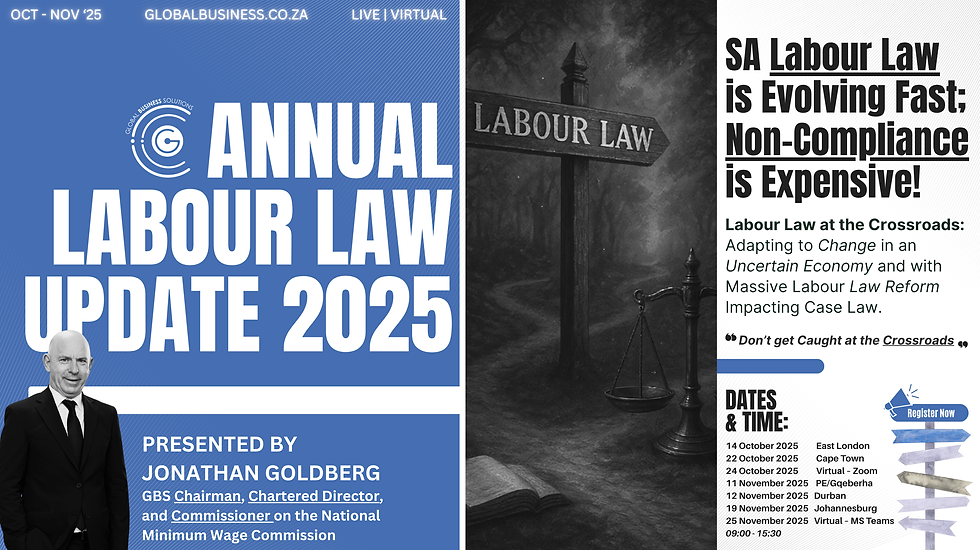ZEP and LEP Extensions: More Uncertainty as Home Affairs Kicks the Can Down the Road Again
- John Botha

- Oct 16, 2025
- 3 min read

The Latest Extensions
On 7 October 2025, Minister of Home Affairs Dr L.A. Schreiber issued two ministerial directives (Nos. 20 and 21 of 2025) published in Government Gazettes 53483 and 53484, extending the validity of both Lesotho Exemption Permits (LEPs) and Zimbabwean Exemption Permits (ZEPs) by a further 18 months.
The key provisions are:
New expiry date: Both LEPs and ZEPs, which were set to expire on 28 November 2025, are now extended until 28 May 2027
Protection from deportation: No permit holders may be arrested, detained, or deported solely for not having a valid exemption certificate
Entry and departure: Holders may enter and depart South Africa without requiring a valid visa in their passport, provided they meet all other entry requirements
Visa applications: LEP and ZEP holders are not required to produce a valid exemption certificate when applying for any category of temporary residence visa
A Pattern of Procrastination
This extension represents yet another instance of the Department of Home Affairs postponing a final decision on the fate of these exemption permit holders. The Immigration Advisory Board (IAB), appointed in April 2025, has deliberated on "the immediate future and a long-term solution" for LEP and ZEP holders, with the Minister noting that "critical stakeholders will need to be part of a consultation process."
However, this is becoming a familiar refrain. The Department has repeatedly extended these permits over the years, creating a cycle of uncertainty that affects:
Foreign nationals who cannot plan their futures or make long-term commitments
Employers who struggle to manage workforce planning when employees' legal status remains in limbo
Government departments that must continuously adjust their administrative processes
The broader economy which thrives on certainty and stability
While the humanitarian considerations are valid and the consultation process necessary, the repeated extensions without a clear pathway forward suggest a failure of policy planning. These exemption schemes were always intended as temporary measures, yet they have become semi-permanent fixtures of our immigration landscape through repeated postponements rather than through deliberate policy design.
Employer Due Diligence Remains Critical
Despite these extensions, employers must not become complacent. The duty to perform proper due diligence on the immigration status of foreign national employees remains unchanged and critically important.
The recent high-profile inspections at textile factories in Ladysmith, KZN, serve as a stark reminder of the risks. These inspections revealed numerous compliance failures, resulting in:
Arrests of undocumented foreign nationals
Potential criminal charges against employers under Section 49 of the Immigration Act
Substantial fines and potential business closure orders
Reputational damage that cannot be easily repaired
Disruption to operations and supply chains
What Employers Must Do
Even with LEP and ZEP extensions in place, employers must:
Verify documentation: Confirm that each foreign national employee holds valid authorization to work in South Africa, whether through an exemption permit, work visa, permanent residence, or other lawful status
Maintain proper records: Keep certified copies of all immigration documents on file and ensure these are readily available for inspection
Monitor expiry dates: Despite this extension, individual circumstances vary—not all foreign nationals hold LEPs or ZEPs, and other permits may expire on different dates
Implement systematic checks: Establish regular verification processes rather than one-off exercises
Plan for transition: Use this 18-month window to work with affected employees on securing permanent immigration solutions rather than assuming further extensions will be granted
Seek expert advice: The immigration landscape is complex and constantly changing—professional guidance can help navigate compliance requirements and avoid costly mistakes
While the extension of LEPs and ZEPs until May 2027 provides temporary relief, it does not resolve the underlying policy uncertainty. More importantly, it does not diminish employers' legal obligations to ensure their workforce is lawfully employed.
The Ladysmith inspections demonstrate that the Department of Home Affairs and the Department of Employment and Labour are actively enforcing immigration and employment laws. Employers who fail to conduct proper due diligence face significant legal, financial, and reputational risks.
As we await yet another round of consultations and deliberations, responsible employers should use this extended period not as an excuse for inaction, but as an opportunity to ensure full compliance and to assist affected employees in securing long-term legal status in South Africa.
Join us at the Annual Labour Law Update. This year's theme is Labour Law at the Crossroads: Adapting to Change in an Uncertain Economy and with Massive Labour Law Reform Impacting Case Law. What you'll gain:
Master the Digital Transformation of Labour Law in 2025
200+ Labour Law Cases Unpacked by Jonathan Goldberg
Critical Updates on Upcoming Legislation & NEDLAC Amendments
Navigate Workplace Challenges from the Digital Era to Discrimination Laws

View our upcoming events: Upcoming Events, like Landmark Judgment: Equal Parental Leave for All Parents, Employment Equity Reporting, Managing Absenteeism in the Workplace, and #ALLU2025.
*All workshops are offered as customised in-house training that can be presented virtually or on-site.
"Global Business Solutions (GBS)—Your Partner in Strategic HR Compliance"




Comments